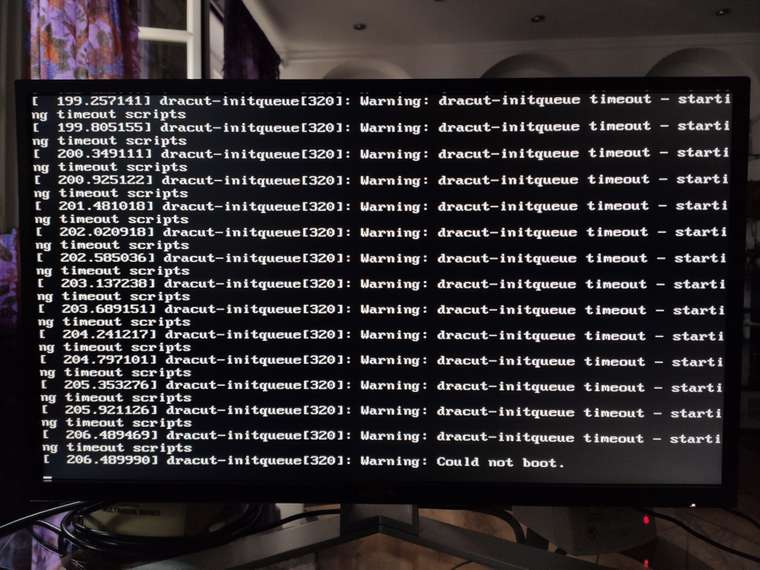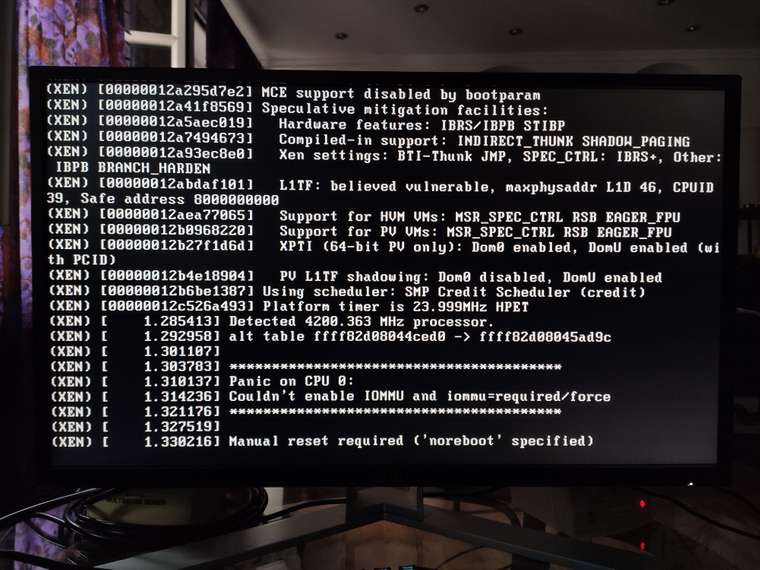"CROSSTalk" CPU vulnerabilty (cross-core data leak)
-
@demanzke fixed the picture

-
Do you get an emergency shell after
dracut-initqueue timeout? If yes, there are probably logs that you can read from the current filesystem (which is in RAM at this stage of the boot process so probably disappears afterwards). -
There is no emergency shell after the failed boot, sadly.
This is what happens after the loading bar on default settings:

Right after selecting "Safe Boot":

Installing the suggested kernel 6.0.10 changed nothing. Should I try downgrading other packages or an even older kernel version?
-
@demanzke said in "CROSSTalk" CPU vulnerabilty (cross-core data leak):
Installing the suggested kernel 6.0.10 changed nothing. Should I try downgrading other packages or an even older kernel version?
Yes, please try:
yum downgrade xen-dom0-libs xen-dom0-tools xen-hypervisor xen-libs xen-toolsThen if it still changes nothing:
yum downgrade microcode_ctlAfter all this, you'll be theoretically back to the state from before the update... Though there may be an issue with the initrd generation, which would still not allow you to boot.
-
@stormi said in "CROSSTalk" CPU vulnerabilty (cross-core data leak):
Yes, please try:
yum downgrade xen-dom0-libs xen-dom0-tools xen-hypervisor xen-libs xen-toolsThen if it still changes nothing:
yum downgrade microcode_ctlAfter all this, you'll be theoretically back to the state from before the update... Though there may be an issue with the initrd generation, which would still not allow you to boot.
Sadly nothing changed after downgrading the packages. The only thing I have changed after the base install was installing your ZFS port.
At this point I would try a fresh install on the weekend and see if the problem reappears unless you have another suggestion. -
If we want to understand fully what happens, we could compare the contents of the initial ramdisks:
- initrd-4.19.0+1.img => doesn't work anymore
- initrd-fallback.img => still works
One can extract them with:
mkdir initrd-current cd initrd-current/ /usr/lib/dracut/skipcpio /boot/initrd-4.19.0+1.img | zcat | cpio -ivd cd .. mkdir initrd-fallback cd initrd-fallback/ /usr/lib/dracut/skipcpio /boot/initrd-fallback.img | zcat | cpio -ivdI don't know what differences to look for, to be honest. Maybe you could save those files and upload them somewhere for anyone interested to look at?
Reinstalling the host then trying the update again, without ZFS first, then with it (which probably means reinstalling again and redoing the steps), could also be interesting to help precisely understand what happens.
For now, it mainly looks like it's related to the initrd, which is generated by
dracutwhen the kernel or other kernel modules (such as the kernel module for ZFS) are installed. As you may know, the initrd is the initial ramdisk which contains a minimal system booted before the actual system and which must be able to mount your root filesystem to be able to continue. Unfortunately we don't know from the output you get what the error is so it's all conjectures. -
When this Crosstalk microcode update hit last week there was an issue with certain Intel CPUs where we coudn't boot after the patch was applied. I run Linux Mint on my laptop and I couldn't boot it after taking the microcode update. I had to boot into recovery and then
apt remove intel-microcodeto get it back to a working state. Later that day, Ubuntu (or whoever) released a new intel-microcode update that corrected the problem.Not sure if this is even remotely close to the same issue but wanted to put this out there.
-
Has anyone else encountered this issue? Wondering if these patches should be pulled until this gets resolved.
-
As far as I know, those patches work well on Citrix' test hosts. They also work well on our hosts at Vates. The microcodes underwent Intel's QA so I don't expect them to break on the vast majority of hardware, though there are reports of issues with some specific models. In @demanzke's case, reverting to the previous microcode did not fix the issue so at first it doesn't look like it's related to the microcode.
-
Intel just released updated microcode (actually it's a revert) for some models: https://github.com/intel/Intel-Linux-Processor-Microcode-Data-Files/releases
I'll update the microcode_ctl package.
The "older" microcode that is used instead is still recent enough to contain the fixes against CROSSTalk / SRBDS.Or so I had understood, but I can't find evidence about it. -
-
Hi do i need to patch my xenserver using AMD EPYC ? Those patches get offered to my AMD nodes by XO.
On intel Xeon nodes it makes sense to me .... -
I would say: always apply patches, but you are free to reboot when you want. Obviously, for you, it won't change anything (no microcode update) but keeping your hosts up to date is a good practice

-
@stormi said in "CROSSTalk" CPU vulnerabilty (cross-core data leak):
Intel just released updated microcode (actually it's a revert) for some models: https://github.com/intel/Intel-Linux-Processor-Microcode-Data-Files/releases
I'll update the microcode_ctl package.
The "older" microcode that is used instead is still recent enough to contain the fixes against CROSSTalk / SRBDS.Or so I had understood, but I can't find evidence about it.So should I wait applying these updates? You seem to be unsure of which microcode version to distribute.
-
I'm unsure for Skylake. Not for other CPUs.
-
Thanks for the clarification. No Skylake present, so I will proceed.
-
Finally got some time to test your suggestions.
Removing the microcode_ctl package without dependencies did not help.
Here are both initial ramdisks for anyone interested to look at.Reinstalling XCP, then ZFS, then updating all packages worked fine.
-
@demanzke So this time no boot issue after installing the update?
-
@stormi Exactly. Must've been related to something other than just the latest packages.